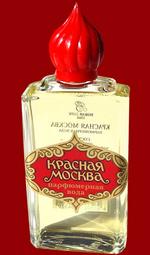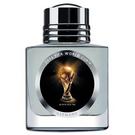Scented Thoughts: My National Parfum

Since with time our ideas tend to become simpler, the notion has struck us after writing our previous post on Patriotic Perfumes that a convenient way to address the question of the relationship between patriotism and perfume is to turn towards the testing of the whimsical project for now of creating a national fragrance.
Countries have national anthems and flags with recognizable national colors but so far, to our knowledge at least, there has not been any governmental attempt at promoting an emblematic national scent or perfume. This may appear paradoxical because as we know, olfaction bypasses the conscious mind and is thus capable of recreating the past or transporting us to a place other than where our physical body is. This means that within the context of a nationalist project, the motherland or fatherland and the history of a country could theoretically be always present, contained in the few droplets of a national perfume and conjured up with each application. With such a powerful tool to influence people's consciousnesses one would think that it would have been deeply exploited. But, curiously enough, not really (Added: until Dec 2007 that is when the Korean presidential candidate Lee Myung-Bak is reported to use perfume as a means to influence voting)........

Sometimes scents are produced to commemorate significant political or collective events. However, these scents are not national per se, they have a national meaning to some extent, but only indirectly. After the French Revolution of 1789, perfumes such as Parfum à la Guillotine and Parfum à la Nation were produced to celebrate the new political order. We can also think of L'Heure Attendue by Jean Patou issued in 1946 to commemorate the liberation of France. More recently, the FIFA World Cup 2006 has been accompanied by the launch of a fragrance. These are more celebratory and commemorative scents than active identity markers.
Is olfaction perceived to be such a negligible channel for raising national consciousness or on the contrary is it thought to be potentially able to trigger so much awe that political caution and hence, in the end, more freedom for the individual prevails?
There is a dualistic aspect to olfaction; it is at once commonly subordinated to "higher senses" vision and hearing in particular, hence neglected in that sense yet at the same time intimately recognized by many as such a powerful medium of perception as to be at times incontrollable. In other words, even if as a politician you might acknowledge its intrinsic value at influencing the masses, at the same time the same cunning political old-hand might hesitate to unleash its influence, one that might not be wholly controllable. Because olfaction is the most intimate of our senses, perhaps it is the case that even the most hardened politician unconsciously preserves that area of experience as one of individual freedom. Could I, as an instigator of this project, forsake what my nose picked on certain days of my childhood and which are associated with my happiness as a child, my home, my family, and by extension, my own intimate sense of my country? Moreover, experience would inform me that the flip side of the power of olfaction is the rapid lassitude that may ensue, more quickly so than with music. However we do not tire of the national anthem because we do not listen to it ad nauseam but on meaningful occasions. The same would apply to a national perfume; it would scent the air on specific occasions.
Nevertheless, we continue to think that the charm of a perfume is all the more potent if it is unconscious. We may be touched when we suddenly smell a long-forgotten scent identified as an isolated island of time in the midst of current events, yet it is so because it happens despite our will. If it were otherwise, we might come to resent an aroma that we were conditioned to like and to solemnize.

To me, the sense of smell is a priori the most apolitical and the most social of our senses. Shared smells evoke smaller human groups: people that are following a fashion trend, people sharing the same regional landscape and food in a certain locale, people at dinners, parties, people who like a family of perfume, what not.
An important characteristic of Westernized culture is that perfume in our society is a mark of distinction rather than one of bonding. In Turkey and in other countries of the Middle East a perfume traditionally is a symbol of conviviality and human connectedness. You pass around a little box containing rose oil on a cotton ball for everyone to smell and enjoy, as a sign of hospitality. The ubiquitous Turkish lemon cologne performs a similar function. But could this potential message of connectedness expressed through perfume be exploited at the national level?

The perfume that for me is closest to having or having had a national status is the Soviet perfume Krasnaya Moskva (Red Moscow) by Novaya Zarya (New Dawn). This is not because we have smelled it on the whole territory of the ex Soviet Union, rather it is so because we know it was one of the few commonly available Soviet perfumes at the time. It really was ubiquitous. As with other Soviet goods the range of selection was limited and supply, at times, scarce. But certain things you seemed to see reappear regularly, sausages, black bread, vodka, and Red Moscow. The result is that many Soviet women came to dislike the scent of Red Moscow because it was so widespread in a context not of fashion but of economic and ideological restrictions. As one ex employee of Novaya Zarya states in an interview and as she was recalling the good old times of centralized planning,
"It horrified me!" Vitkovskaya said, shuddering at the memory. "You'd go to a concert and all the women smelled the same. They would import lipsticks -- a million of them, all in the same color. Whether a woman liked it or not, she had to wear it."
Apparatchiki, people from the Soviet establishment, were luckier and could access a wider selection of fine Soviet fragrances as well as count on more regular access to imports.
The case of Red Moscow could be explored further but it already points to the difficulty of promoting an imposed, almost unique fragrance. There exists a sphere of intimacy that perfumes seem to create. Of course, perfumes behave differently depending on the "chemistry" of one's skin, one's emotions or diet so there would be variations but not enough to satisfy one's sense of intimacy.
If we contrast this case with that of Angel in France, we are left with the impression that a single popular fragrance can impose itself in the hearts of its wearers if not through centralized planning at least through fashion and commonality of tastes. France, one of the most politically centralized countries in the world does reveal a hierarchy of public preferences for certain perfumes despite the sea of fragrance selection the French can decide to dive in. It is very clear; the number one perfume used to be Chanel no 5, now it is Angel by Thierry Mugler. Chanel no5 has been bumped to the second position. Not exactly what you would call a reversal of trend. Angel is the smell of a Christmas fair in Alsace. This one piece of regional and childhood memory of an individual, Thierry Mugler, has become endowed with near-national meaning, but not quite. A French women claims that she feels unwell if she forgets to spritz Angel on and has to go to the nearest perfumery on her way to work to get hold of a tester.

A social historian like Alain Corbin has stressed the negative power of scent which can be seen to be unavoidable and inescapable when suddenly a malodorous smell assaults one's nostrils. In certain social situations, sometimes the best we can do is discreetly turn our heads away from the source of repulsion. It would be improper in most cases to use your fingers to pinch your nose, make a face, and depart hurriedly from the scene of olfactory unease. With this type of perspective, scents are seen more as drawing invisible social barriers between people than as an indispensable positive element of social relationships.
But if you think about it in other ways, it becomes quite clear that there is an enormous amount of individual freedom left by society to individuals to be experienced through their sense of smell in spite of all the attempts at regulating the usage of perfumes in public space. We are not trained to smell a certain way at school since grade 1 or even earlier. If we elect to find Play-Doh olfactorily pleasing, it is by association not by training.There are no academic schools clashing over interpretations of smells. Because the sense of smell of individuals is under the radar of governments in most cases it preserves a space of autonomy for the individual.
There is however a sense of high-brow and low-brow culture in perfume. But really, it is mostly for show. Most people guiltily confess liking perfumes other than the ones coming out of the prestige houses. People feel guilty because although good taste and snobbery dictate you emit a reserved judgment regarding J.Lo and Paris Hilton perfumes or simple oil essences, people still cannot help but love them when they are well made.
Corporations seem to have understood sooner than politicians that olfaction could become the new and perhaps the most efficacious sense to be influenced by the will of a collective project, here, marketing. Brands now develop smelly logos, diffuse a certain perfume in the ambiance of a store to create, hopefully, happy associations in the minds of consumers. Usually stores play on pleasant and logical associations like diffusing a clean shirt smell in the men's shirt's section or a wheat smell in the bakery section.
The other day we stepped into Macy's and we became immediately aware that we were entering a new olfactory territory. It was like an invisible scented field that materialized however invisibly as we took a step or two away from the entrance door. We do not recall what it smelled like in particular but it smelled pleasant.
Civil rights activist might want to take a closer look at these new developments as we may need to reclaim our olfactory freedoms in the future. At this point in time, smell appears mostly overlooked but not by everyone and as citizens and consumers, we should become aware that our most intimate memory associations are being manipulated.
Brands want to seduce consumers, just like it has been the job of women in particular to attract men through the use of scents conceived of as near-magical spells. We also once read how a mother-to-be was busy deciding what permanent signature perfume she would be wearing because she wanted her children to associate a scent with her in a deep emotional manner when they grew up. Perhaps women have understood the politics of perfume far better than men. Perhaps we can never tire of a unique smell that carries so many affective triggers with it. It probably needs to be an invisible and subtle action to be more efficacious. So the appearance of a bottle of perfume shaped like the United States or the star-spangled banner and containing a ravishing national fragrance next to the flag is not to come about for the foreseeable future, except as a hoax. We need to collect our own bouquet of olfactory associations for it to be truly meaningful and intimate. In the end, it is probably politically more astute to leave smells to the private sphere in order to foster identification of the individual with the nation. As Angel shows, it can work better with the bottom-up approach than with the top-down one as Red Moscow demonstrates for the latter.
Image sources: redavantgarde.com, imaginationperfumery.com, soccer.com, 4-fragrances.com, demeterfragrance.com.
<








Thank god for "blat" (connections in the right places, but I'm sure you don't need my translaton :-)). Neither my mum nor my grandma owned Krasnaya Moskva. Somehow my mum managed to obtain "the western" stuff. I think she would have been insulted if someone (like my hapless dad) have given her Krasnaya Moskva or anything "Soviet" :-) Come to think of it, I don't remember seeing Red Moscow in any of my friends' or relatives' houses. Perhaps, because it was thought to be so...unprestigious, uncool, if they did own it, they hid it somewhere out of sight :-)
Amazing Post, Helene. I have nothing to add, since I am still digesting it, other than to say "wow".
Well, this is the 2nd "typical" Soviet or Russian object that I see your family and your entourage didn't own (with the samovar)!
My parents were friends with Soviet diplomats and I remember how my mother got presents like finer Soviet perfumes in beautiful bottles and boxes. I remember how I thought they smelled different from French perfumes, very much like "fur perfumes".
It's true at the same time that there were many French perfumes available in the USSR according to what I am told. Even after the end of the Soviet Union I remember how I would find incredible deals on hard-to-find French perfumes.
It would be interesting for me to try to retrace more precisely the history of Red Moscow because its perception and use might have been different depending on the time period we were talking of:)
Wonderful observations. I really hate it when I feel like my nose is being manipulated.
I think the smell area of the brain is the so often overlooked and ignored, and I cringe to think of it being exploited and how many people won't even realize it.
Anya,
You are very kind:) I still need to think all these things through myself.
Patty,
Because we are all so concentrated on perfumes amongst perf bloggers, it's a bit tricky sometimes to know or remember where most folks stand. But the fact is that some people with lots of money and power do pay real close attention to this sense.
You have given us all a lot to think about, H.
I agree with Patty: Smell may be the least explored, yet most exploitable sense that we share as human beings. I shudder to think of the psychologically exploitative possibilities, don't you?
Hugs!
Thanks for the post! Like Marina, I don't recall having/using Krasnaya Moskva, and several of my friends' mom had the hard to find then French classics. But I'm curious to know now, did you grow up there? Do you have Russian roots? :)
Fascinating post. I do remember Krasnaya Moskva as being ubiquitous in the subways and on the streets in Moscow during Soviet times, but the people I actually knew all wore scents like Climat or other French perfumes.
R,
I hope to find the time to explore these issues more at length in the future.
I shudder too. If people want to manipulate me, just let them make me smell Sublime. It makes me feel weird. Actually, I'd need to revisit it to see if it still has the same effect on me.
Ina,
No, I did not grow up in the USSR but I did make several stays. I don't have Russian roots but there is a tradition of Polonophilia and Russophilia in my family:) After the collapse of the USSR I was staying in Baku and I remember how you could find all these fine French perfumes obviously procured at a very low cost.
Elle,
Thank you. I wished I had payed more attention to what people were actually wearing. I know French perfumes were very popular. I have a friend from Uzbekistan who recently told me how she didn't care much for KM while saving up most of her salary to buy expensive French perfumes instead. Nevertheless, Krasnaya Moskva was very big in the USSR, alongside other perfumes, but KM was, for example, awarded a gold medal at an international exhibition in Brussels in 1958. I found several Russian sources that speak of KM as being particularly prominent; someone even commented that it had the status of a business card not only for Novaya Zarya but also for the whole of the USSR.
Nothing to add, just wanted to praise you for such a provocative and interesting read today :) (And love inclusion of the Play-Doh in there!)
Katie,
Thanks:) I was able to include the Play-Doh ref. in a personal manner here because I play with it when I go do parent help at my son's daycare or at home, not because I grew up smelling it:)
For me, the equivalent of that childhood/school smell, French style, is the fresh, sweet almond note found in the little glue pots we would use when I was growing up as a kid in France. I love this smell.
I have read your post three times and am still digesting it. Thank you for your thoughts. I suppose on some level I am grateful that corporations have actually realized that scent can work for them, from the perspective that they can make an aspect of consumer interaction more pleasant (although I concede that not everyone is pleased by the same smells.) I don't want to be overwhelmed, but a fragrance background other than, say, mildew or the aroma of employees sneaking smokes in the back room would be acceptable... By the way, I was aware for the first time the other day in our local mall that what I was hearing in the background, instead of Muzak, was ... advertising! They were doing the soft sell of various albums, electronic equipment, etc. It was weird.
March,
Thank you for liking my post! It will be very interesting to see how this new attention to scent and smell evolve. So many things that are happening right now sound futuristic, yet they have started to be implemented, used, like the sound-, sorry,huh, the smell-recording machine.
The power of suggestion is certainly well perceived by marketeers! I have not experienced this type of soft sell, yet. I could imagine it to sound a bit creepy; you know as if they were telling you a secret or soothing you with kind words but in fact all they are doing is trying to push some product on you. Ah well, we just need to be educated consumers I suppose.
Mimi-
I've been enjoying your thoughts for some time now... It's comforting to know that others are as inanely passionate about aroma.
I deeply resent olfactory manipulation- it reminds me of the shameless musical maneuvering in film scoring, when the audience is considered too dim to know how to react, and needs to be told by throbbing, crescendoing violins ! Perhaps more insidious, because your emotions are being played upon in a deep, primal manner.
Chaya,
Thank you so much for your kind words. I agree that manipulation of our sense of smell is something that takes place at a much more primal level than with hearing. It is a more discreet intervention too. Moreover people, I think, pay generally less attention to this orchestration of their emotions.
lyshkqb baljgz junfrms otkunzcbh nacbzer jhxnr tuemwjx